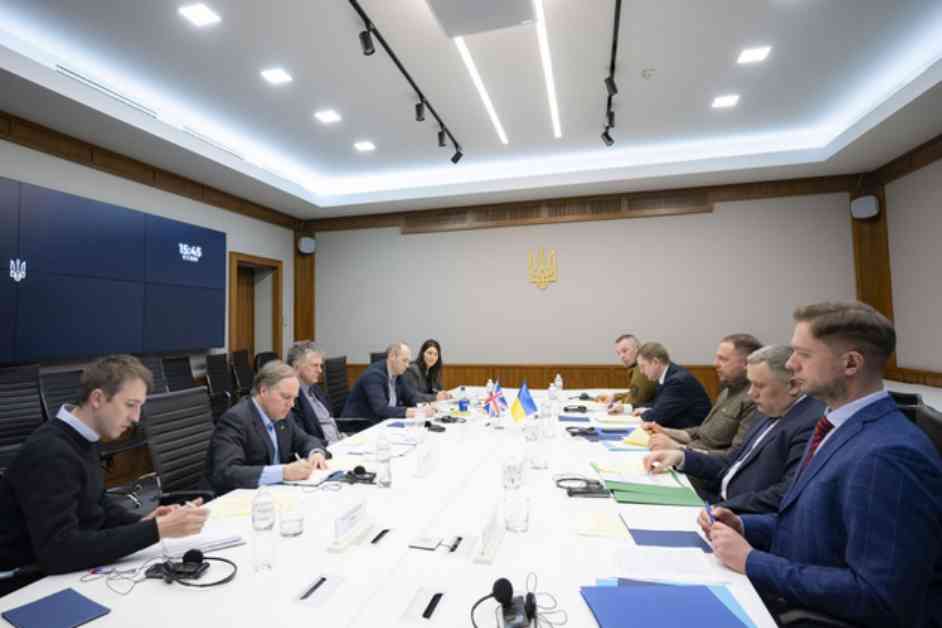In a recent meeting in Kyiv, Andriy Yermak, the Head of the Office of the President of Ukraine, engaged in discussions with Jonathan Powell, the National Security Advisor to the UK Prime Minister. The purpose of their meeting was to delve into the foundational steps necessary to establish a just and enduring peace, along with the potential conditions for a ceasefire. This crucial dialogue, as reported by Ukrinform, marks a significant milestone in the ongoing efforts to address the escalating conflict in the region.
Exploring the Path to Peace
The meeting between Andriy Yermak and Jonathan Powell served as a follow-up to collaborative efforts with international partners to craft a comprehensive plan aimed at securing a sustainable peace agreement. It also set the stage for an upcoming dialogue between Ukrainian and American delegations in Saudi Arabia. One of the central themes of their conversation revolved around the initial proposals put forth by President Volodymyr Zelensky at the European Council in Brussels.
President Zelensky’s suggestions encompassed a range of crucial elements, including a call for a cessation of hostilities in the airspace and maritime domains, a halt to attacks on critical energy and civilian infrastructure, and the cessation of naval military operations. Additionally, the discussion underscored the imperative of releasing prisoners as a critical step towards de-escalation. Moreover, the meeting saw the presentation of additional proposals from France, as well as the Nordic and Baltic nations, underscoring the collaborative nature of the peace-building process.
Key Considerations for Sustainable Peace
During their exchange, Andriy Yermak and Jonathan Powell delved into a host of pivotal issues that are essential for paving the way towards a lasting peace agreement. Of particular significance were deliberations on security assurances, the requisite conditions for a viable ceasefire, and the maintenance of sanctions against Russia as a means of fostering accountability and deterring further aggression.
Notably, the discussions also placed a spotlight on the critical need for bolstering military and financial assistance for Ukraine, as well as fortifying European defense capabilities. In expressing his gratitude to the United Kingdom for its unwavering support in the realm of defense, Andriy Yermak emphasized the critical importance of ramping up this support, particularly with regard to financing the production of Unmanned Aerial Vehicles (UAVs) in both Ukraine and Europe.
By delving into these multifaceted considerations, the meeting between Andriy Yermak and Jonathan Powell underscored the intricate web of diplomatic, security, and humanitarian factors that must be meticulously addressed to forge a sustainable peace agreement in the region.
Robert Fico: From EU Advocate to Moscow Ally
The narrative of Robert Fico’s political trajectory serves as a poignant reminder of the shifting tides within the realm of international relations. Once a vocal proponent of Slovakia’s accession to the European Union, Fico’s stark pivot towards a pro-Moscow stance has raised profound concerns about the nation’s geopolitical orientation and future trajectory.
As Slovakia grapples with the implications of Fico’s alignment with Moscow, a host of complex questions loom large on the horizon, underscoring the intricate interplay between political ideologies, strategic alliances, and national sovereignty. Amidst these shifting dynamics, the specter of uncertainty casts a long shadow over Slovakia’s future, prompting a reevaluation of its place within the broader European landscape.
The evolution of Fico’s political identity—from a fervent advocate for EU integration to a newfound alignment with Moscow—serves as a cautionary tale, highlighting the nuanced complexities that underpin the geopolitical landscape. As Slovakia navigates these turbulent waters, the echoes of Fico’s ideological transformation reverberate far beyond its borders, offering a sobering reflection on the enduring interplay between political expediency and national identity.

















